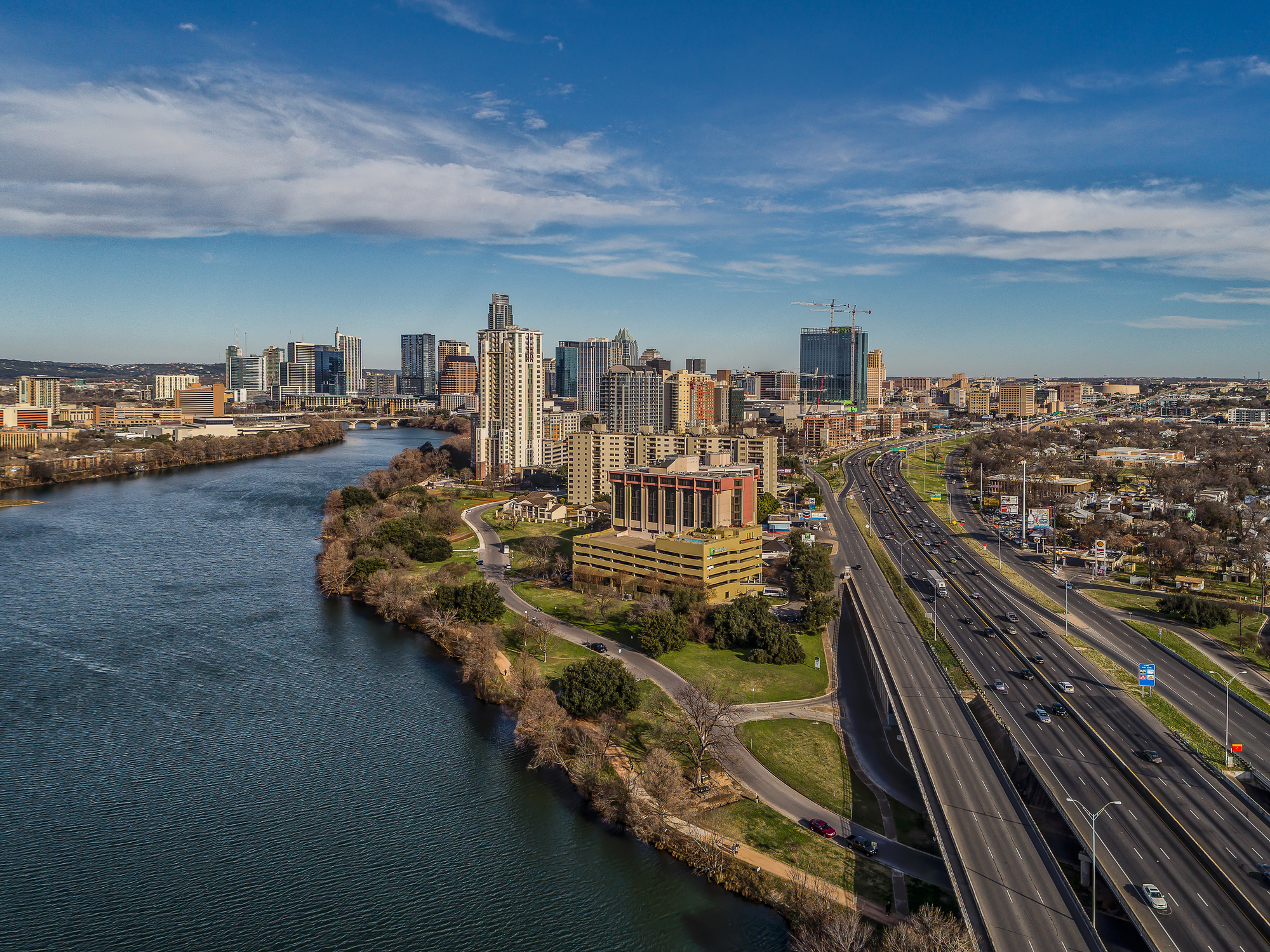In May 2019, the Texas Department of Transportation (TxDOT) unveiled a $7.5 billion plan to expand the abhorred stretch of I-35 that snakes through the center of Austin. Dubbed the Capital Express Project, the proposal’s potential changes were drastic: In addition to adding two levels of tunnels, it would widen the highway on each side by several lanes and significantly increase the interstate’s footprint. State officials proclaimed the proposition, still in its infancy, as the long-awaited answer to the capital city’s notorious traffic woes.
“This is a huge choke point for the entire state of Texas,” Texas Transportation Commission Chairman Bruce Bugg said of the plan. “We now have a solution on the table. The time for talk is over. The time for action is now.”
On its face, the proposal seemed like a promising offer for Austinites who spend countless hours idling on the most congested stretch of road in all of Texas. But in reality, it was the blueprint for an ineffective, outdated strategy that would only spur sprawl, transportation advocates argued. In fact, they pointed out, studies show that roadway buildout actually increases congestion because it fuels the need for car-centric transit.
All of this was on the mind of Austin Mayor Pro Tem Natasha Harper-Madison as she drove up to Dallas later that fall. Born and raised on the capital city’s East Side, she knew the impacts of highway expansion all too well. The place where Black residents had been subjected to decades of systemic racism and financial redlining after being forcibly moved to in 1928, East Austin was effectively cut off from the rest of town by I-35. As a result, the interstate wasn’t just a hulking mass of concrete and asphalt, she said: It was oftentimes the dividing line between the haves and the have-nots.
Given these experiences, Harper-Madison was eager to explore alternative transportation solutions when she first learned about TxDOT’s proposal. Enter Klyde Warren Park, a 5.2-acre public space that was established atop a downtown stretch of Dallas’ Woodall Rodgers Freeway in 2012. Witnessing the vibrant, tree-lined area was nothing short of revelatory, Harper-Madison said. The complex, once consumed by concrete and traffic congestion, had been converted into a natural gathering ground for people from all walks of life.
“Some people like me were just tourists, but others were going about their daily routines. The woman doing yoga, the man walking his dog, the elderly couple making their way through with their walkers. The most outstanding thing, though, was the diversity: Regardless of age, race, or income, folks from all walks of life were there,” Harper-Madison said. “That really struck me. Because it represented a city’s ability to take what is so often a barrier between communities — a highway — and turn it into a place for unity and connection. It turned it into a bridge.”
That trip couldn’t be more pertinent for Harper-Madison and her fellow Austin officials these days. That’s because TxDOT is now on the verge of pushing forward plans to expand I-35 — a painstaking endeavor that leaders worry could result in a big-money boondoggle if not handled correctly. For context, there are three community-drawn proposals that would limit the highway’s existing footprint, downsize it to an urban boulevard, or even incorporate Klyde Warren–inspired green spaces, but the state has shown little interest in entertaining them. Instead, TxDOT has prioritized two “build alternatives” that would simply demolish the I-35’s upper decks and widen the thoroughfare considerably.
Such proposals (which are eerily similar to those being contested in Houston) run in direct opposition to the town’s long-term transportation plans because they double down on a car-centric model less than two years after Austin voters approved a $7 billion mass transit bond. Residents don’t want bigger highways, Harper-Madison said. They want smarter, forward-thinking ways to get around their city.
If allowed to move forward, TxDOT’s proposed expansion will engulf nearly 150 homes and businesses along the interstate. Many of these, like the Stars Cafe and the Austin Chronicle building, are local institutions. Others, such as the Escuelita del Alma day care center, Taqueria Los Altos, and Hector the Barber, are popular utilities whose erasure would leave a glaring absence in nearby communities. With Austin already struggling to combat skyrocketing costs of living and growing suburban sprawl, now isn’t the time to push people out, Council Member Greg Casar said.
“The current plan just creates a wider scar through the middle of our city and makes it harder for people to go east-west, and vice versa. Getting rid of businesses, removing day care centers… That’s not how we boost urban density, provide more affordable housing, or keep communities intact,” he said. “In fact, it doesn’t even fix congestion. We’ve learned from places like Houston and Los Angeles that, if you build a wider and wider highway, you end up triggering more people to move to the edges of a city rather than its core. That in turn increases people’s reliance on cars, the presence of traffic… It’s all connected. We need to focus on public transit, not widen the highway to 20 lanes.”
This isn’t only about traffic or affordability either, Casar said. When you consider the UN’s recent climate report, which referred to the planet’s increasing pollution-fueled issues as a “code red for humanity,” it makes zero sense to prioritize cars and roadways. Doing so is as environmentally hazardous as it is behind the times, he said.
“We all just went through a single year where a freeze left millions of Texans without power, where a hurricane devastated our entire country, from Louisiana all the way up to the northeast. The climate crisis is real, and we have to start pushing our transportation dollars into public transit and fossil-fuel options. Widening highways does just the opposite of that,” Casar said. “If we want to take climate change seriously in this city, we have to take I-35 expansion really seriously. We have to do something really different, not something that comes from the 1970 and ’80s.”
The question, then, is what options do Austin voters have? Primarily, leaders like Casar and Harper-Madison are pushing residents to share their thoughts with TxDOT during its public comment period, which runs through Sept. 24. Because local officials have little direct say over the decision, this is by far the most impactful way to shape the future of I-35 in the capital city. Now is the time to speak up and speak out, Harper-Madison said, because transportation touches so many parts of our daily lives, from the way we explore our cities and the neighbors we live nearby to our ability to connect with people from different communities, income levels, and cultures. In that vein, Austin must continue to embrace a cityscape that’s innovative and inclusive, not out-of-touch and regressive.
“My top three policy priorities are housing, transit, and economic opportunity. This affects all of those things. That’s why we have to step back and view this not just as an effort to expand a highway, but instead understand that it will impact so many core aspects of our city’s future,” Harper-Madison said. “This is one of those multigenerational projects — the kind that shapes lives for years to come. Helping break cyclical poverty, avoiding the worst outcomes of climate change… It’s all right here, if we do it right. That’s why we’ve got to make a careful, informed, and thoughtful decision.”
Photo: Ryan Conine/Getty Images





